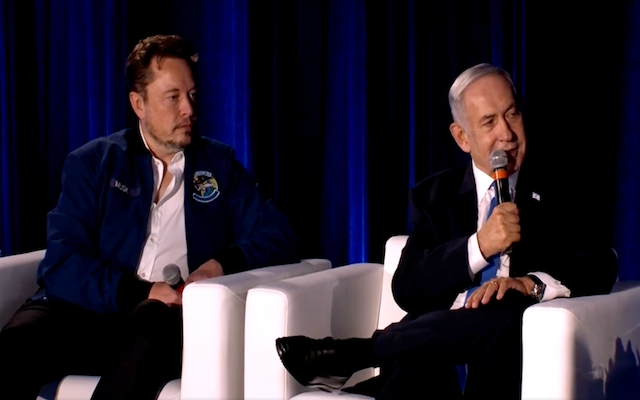The recent meeting between Israeli Prime Minister Benjamin Netanyahu and tech mogul Elon Musk served as an inflection point in the evolving relationship between American Jews and the Jewish State of Israel. What was ostensibly a dialogue on artificial intelligence soon morphed into a spotlight on widening gaps in ideological affiliations.
The Anti-Defamation League (ADL), once an esteemed facet of the B'nei B'rith constellation of Jewish advocacy, has been increasingly enmeshed in social justice causes, such as endorsing the Black Lives Matter movement and advocating for transgender rights in sports. This shift has led the ADL to a social justice stance that doesn't always align with the perspectives of many in the Israeli or more traditional Jewish communities.
🇮🇱 Today at the @Tesla plant, I had a vital discussion with @elonmusk, a stalwart for freedom of expression and against antisemitism. Alongside @gdb and @tegmark, we delved into the transformative power of #AI — both its blessings and its curses.
— Benjamin Netanyahu - בנימין נתניהו (@netanyahu) September 19, 2023
We stand on the threshold of a… pic.twitter.com/Y3JjWjXiLa
Musk, in a preemptive move, addressed allegations of anti-Semitism head-on, framing the subsequent conversation around not just technology but also politics and civil liberties. Streamed live from Tesla's Fremont headquarters via X—the social media platform owned by Musk—the conversation conveyed a sense of isolation for both men, symbolizing their shared feeling of being targeted by an increasingly polarized public discourse.
The context of this meeting cannot be divorced from Musk's ongoing public disagreement with the ADL. Musk has criticized the ADL's transformation into a so-called "woke" entity that occasionally supports causes anathema to many in the Jewish community—some even overtly anti-Israel. The ADL's Jonathan Greenblatt led a boycott against X, attributing to a significant decline in the platform's ad revenue. Thus, the meeting with Netanyahu, arguably one of the most visible Jews globally, carried implicit counter-narrative significance.
Benjamin Netanyahu says Elon Musk is committed to fighting antisemitism after ADL spat https://t.co/XQJRbmitHa
— The Jewish Chronicle (@JewishChron) September 19, 2023
Even in the face of past remarks by Musk linking philanthropist George Soros to conspiracy theories—sentiments often misconstrued as anti-Semitic—the Israeli administration has upheld its positive perception of Musk. Israeli Minister of Diaspora Affairs Amichai Chikli noted that criticism of Soros, who financially supports organizations undermining Israel, should not be automatically labeled anti-Semitic. Netanyahu echoed this sentiment, emphasizing Musk's public stance against anti-Semitism and collective hate.
It's notable that the American Jewish community viewed this meeting, held during the holy week of Rosh Hashanah and Yom Kippur, as a betrayal of sorts. They argue that Netanyahu granted Musk absolution for alleged anti-Semitism in the name of technological collaboration. Conversely, Israeli sentiment largely sees Musk as an advocate for free speech, a value upheld even when it brings unpleasant discourse into the public sphere.
This divergence underscores the political and ideological chasms that are emerging. While the ADL, under Greenblatt—a former advisor to President Barack Obama—sought to pressurize social media platforms like X into content moderation, Musk responded by championing free speech, reinstating banned accounts of varied political hues. It's a complex battle between principle and expediency, ethics and realpolitik.
Musk and Netanyahu Discuss AI, Antisemitism, and More: The Full Conversation | WATCH@elonmusk and @netanyahu held a live-streamed conversation on Musk's social media platform, X. They discussed topics including artificial intelligence, antisemitism, Israel's judiciary, history,… pic.twitter.com/6JvMmBGGn3
— Adam Albilya - אדם אלביליה (@AdamAlbilya) September 20, 2023
In essence, the meeting between Netanyahu and Musk unveiled more than mutual interests in AI; it exposed deep-rooted fissures between American Jewish liberal perspectives and Israeli stances, which often lean more conservative and security-focused. It also threw into relief the complexities surrounding free speech, a value both men hold dear but one that comes with its own set of perils.
Both figures find themselves at crossroads, balancing not just their respective national and business interests, but also the deeply emotional and fraught terrain of Jewish identity and representation in a world grappling with polarizing social movements. This high-profile interaction serves as a lens, revealing the multifaceted, and sometimes discordant, relationships that exist between American Jews, Israel, and broader geopolitical currents.
By standing together, albeit in a dark, isolated room, Musk and Netanyahu articulated a narrative that transcends technology. They delved into the intricate web of social change, political evolution, and the increasingly challenging endeavor of harmonizing a splintered global Jewish community.


